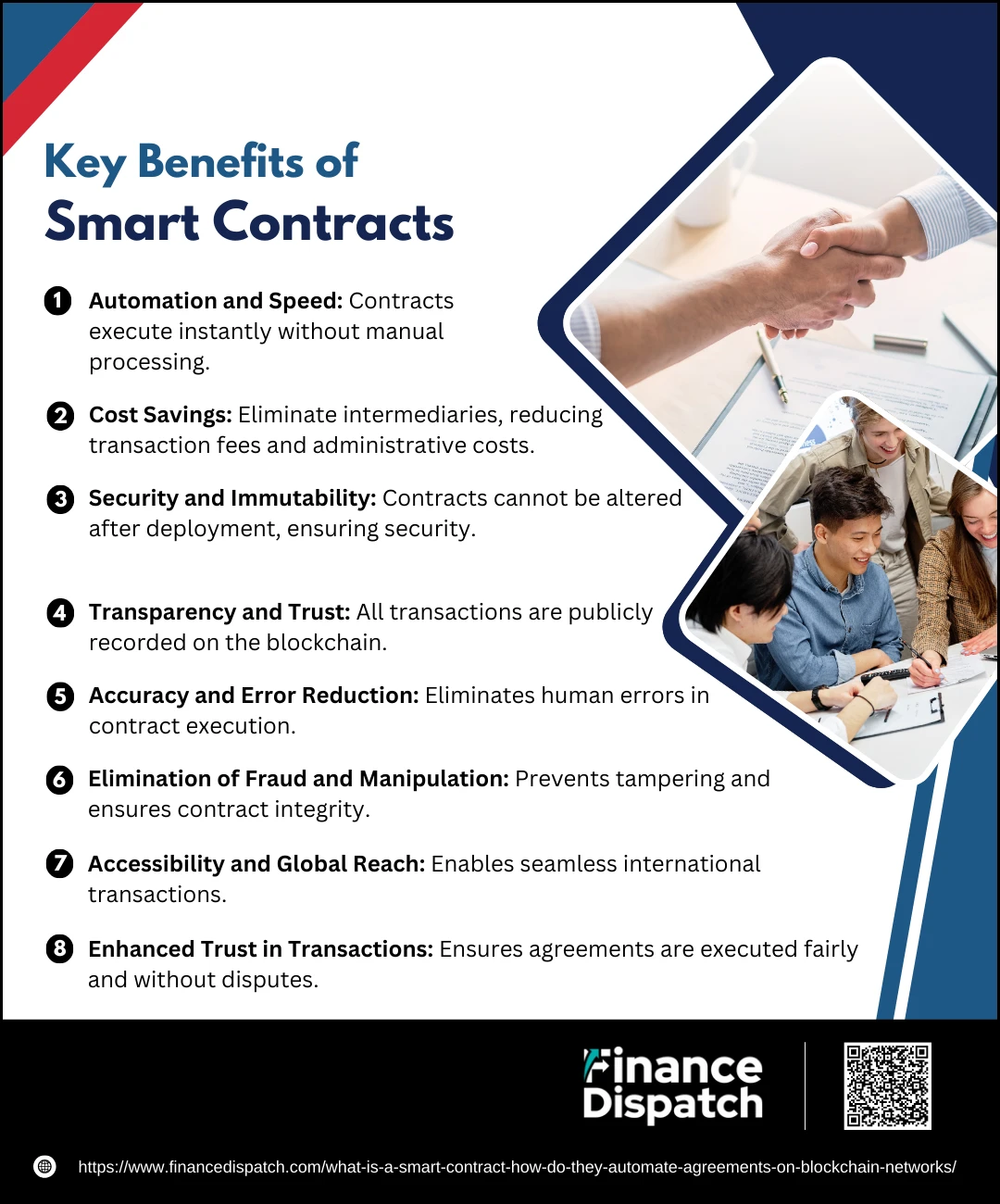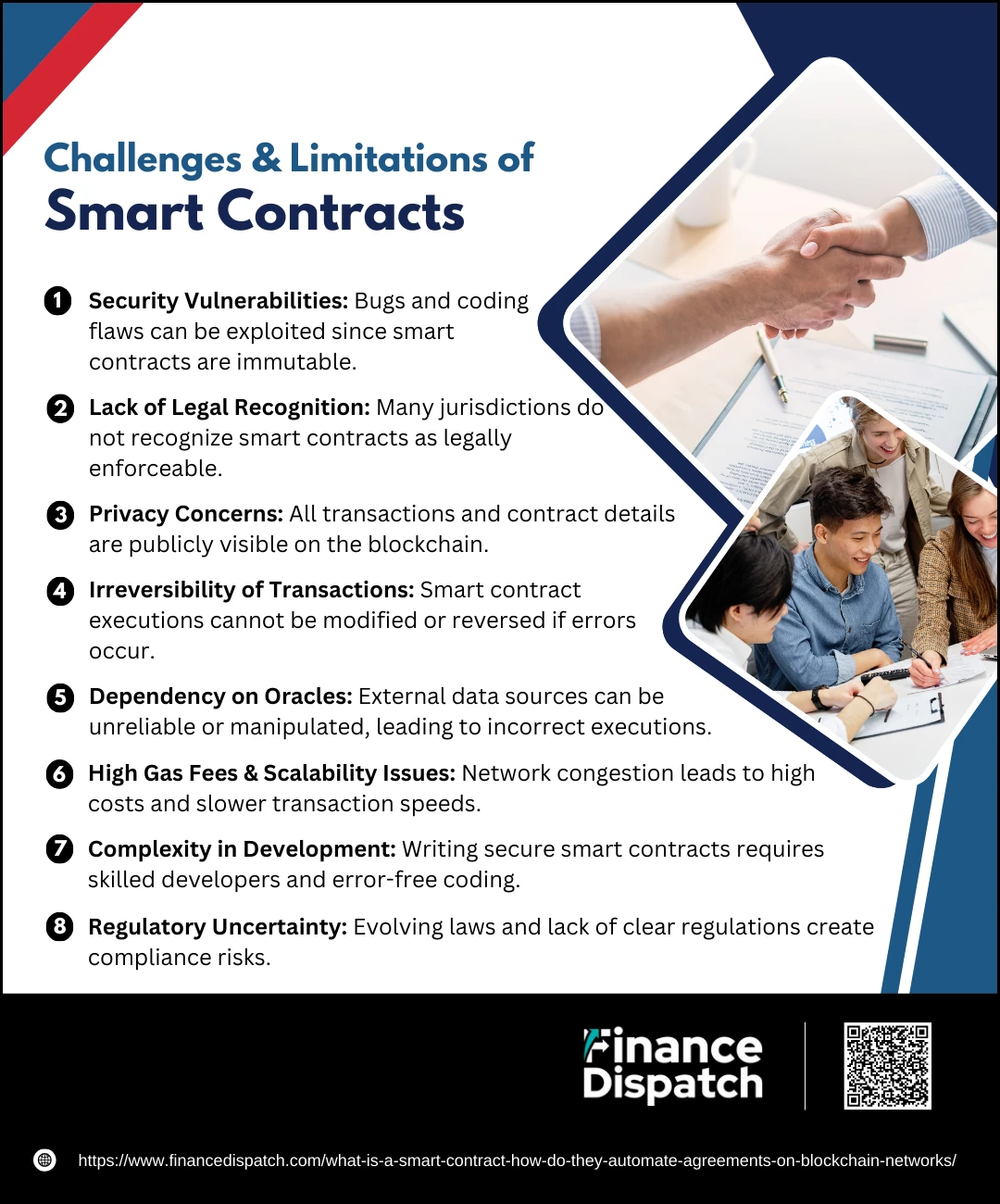Imagine a world where contracts execute themselves—no paperwork, no middlemen, and no delays. This is the promise of smart contracts, an innovation powered by blockchain technology. A smart contract is a self-executing agreement with the terms directly written into computer code. Once predefined conditions are met, the contract automatically executes without requiring human intervention. By eliminating intermediaries such as banks, lawyers, and brokers, smart contracts enhance efficiency, reduce costs, and ensure trustless, tamper-proof transactions. From finance and supply chain management to real estate and gaming, smart contracts are transforming industries by automating agreements in a secure, decentralized manner. But how exactly do they work, and what makes them so revolutionary? Let’s dive in.
What is a Smart Contract?
A smart contract is a self-executing digital agreement stored on a blockchain, where the terms of the contract are directly written into computer code. Unlike traditional contracts that require intermediaries like lawyers or banks to enforce agreements, smart contracts operate autonomously—executing actions when predefined conditions are met. This automation ensures trust, accuracy, and efficiency in transactions without the need for manual intervention. Because smart contracts run on blockchain networks, they benefit from immutability, transparency, and security, meaning once deployed, they cannot be altered or tampered with. Whether facilitating financial transactions, verifying ownership, or automating supply chain processes, smart contracts are revolutionizing the way agreements are made and enforced in the digital age.
 Types of Smart Contracts
Types of Smart Contracts
Smart contracts come in different forms, each designed to serve specific functions based on the needs of users and industries. While all smart contracts automate transactions and enforce agreements, their structure and execution can vary depending on the level of complexity, security requirements, and use cases. Below are some of the most common types of smart contracts:
1. Financial Smart Contracts
These contracts automate financial transactions, such as lending, borrowing, and automated payments, eliminating the need for banks or intermediaries. They are widely used in Decentralized Finance (DeFi) applications.
2. Escrow Smart Contracts
Escrow contracts hold funds or assets in a secure blockchain account and release them only when certain predefined conditions are met. They are commonly used in real estate transactions, freelance payments, and online marketplaces.
3. Governance Smart Contracts
These contracts enable decentralized decision-making by allowing users to vote on proposals in Decentralized Autonomous Organizations (DAOs). They help communities and blockchain projects manage rules and policies transparently.
4. Multi-Signature Smart Contracts
Designed for enhanced security, multi-signature contracts require multiple parties to approve a transaction before execution. They are often used in corporate transactions, joint asset management, and high-value transfers.
5. Insurance Smart Contracts
In the insurance industry, smart contracts automate claim verification and payouts, ensuring that policies are enforced fairly and without delays. They execute payments based on predefined triggers, such as flight cancellations or medical emergencies.
6. Supply Chain Smart Contracts
These contracts enhance supply chain transparency by tracking goods from production to delivery. They automatically update records and release payments when shipment milestones are achieved, reducing fraud and inefficiencies.
7. NFT and Gaming Smart Contracts
Used in the NFT (Non-Fungible Token) and gaming industries, these contracts manage digital ownership, royalties, and in-game transactions. They ensure that creators receive fair compensation and that digital assets can be securely bought, sold, or traded.
 How Smart Contracts Automate Agreements on Blockchain Networks
How Smart Contracts Automate Agreements on Blockchain Networks
Smart contracts are revolutionizing the way agreements are executed by enabling automated, tamper-proof transactions without the need for intermediaries. These self-executing contracts run on blockchain networks, where they automatically enforce terms and conditions once predefined criteria are met. By eliminating manual processes, reducing costs, and ensuring transparency, smart contracts offer a more efficient way to manage agreements in finance, supply chains, real estate, and beyond. Below is a step-by-step breakdown of how smart contracts automate agreements on blockchain networks:
1. Defining the Agreement
The first step involves outlining the terms and conditions of the contract. These terms, which could include payment schedules, delivery deadlines, or approval mechanisms, are written in code rather than legal documents.
2. Writing the Smart Contract Code
A developer programs the smart contract using a blockchain-compatible programming language such as Solidity (Ethereum) or Rust (Solana). The code includes specific conditions that must be met for the contract to execute.
3. Deploying the Contract on the Blockchain
Once written and tested, the smart contract is uploaded to a blockchain network, making it immutable and tamper-proof. It now exists as a permanent digital agreement stored across multiple nodes.
4. Monitoring for Trigger Events
Smart contracts continuously monitor the blockchain or external data sources (via oracles) for the agreed-upon conditions. These conditions could be as simple as a payment being received or as complex as verifying supply chain milestones.
5. Automatic Execution of Agreement
When the predefined conditions are met, the contract automatically executes the agreed action. This could involve transferring cryptocurrency, updating records, or verifying digital ownership without human intervention.
6. Recording the Outcome on Blockchain
Once executed, the transaction is permanently recorded on the blockchain. This creates an unalterable and transparent record that all parties can verify, ensuring trust and accountability.
7. Enforcing Security and Compliance
Smart contracts enforce agreements securely by removing the risk of manual errors, fraud, or disputes. Since they are decentralized and operate on blockchain networks, they eliminate the need for trusted third parties.
 How Do Smart Contracts Work?
How Do Smart Contracts Work?
Smart contracts are self-executing digital agreements that automatically enforce and execute predefined terms without the need for intermediaries. Running on blockchain networks, these contracts ensure transparency, security, and efficiency in transactions. Once deployed, a smart contract operates autonomously, executing actions only when specific conditions are met. This automation eliminates delays, reduces costs, and enhances trust in various industries, from finance and supply chain management to real estate and insurance. Below is a step-by-step breakdown of how smart contracts work:
1. Defining the Terms of the Agreement
Before coding, all parties involved agree on the terms and conditions of the contract. These may include payment rules, ownership transfer conditions, or deadlines.
2. Writing the Smart Contract Code
A developer writes the contract using a programming language such as Solidity (Ethereum) or Rust (Solana). The code defines what actions will be executed when specific conditions are met.
3. Deploying the Smart Contract on a Blockchain
Once coded and tested, the contract is deployed onto a blockchain network. This makes it immutable, meaning it cannot be changed or tampered with after deployment.
4. Waiting for Trigger Events
The smart contract monitors blockchain transactions or external data sources (via oracles) for conditions to be met. These triggers could include receiving a payment, a shipment being confirmed, or a specific date being reached.
5. Automatic Execution of Contract Terms
When the predefined conditions are satisfied, the smart contract automatically executes the agreed action. This may involve transferring funds, verifying ownership, or updating records without human intervention.
6. Recording the Transaction on the Blockchain
Once executed, the contract logs the transaction permanently on the blockchain. This ensures transparency, prevents disputes, and allows all involved parties to verify the transaction.
7. Ensuring Security and Finality
Because smart contracts run on decentralized blockchain networks, they are secure, transparent, and resistant to tampering. Once executed, the contract’s outcome cannot be altered, ensuring fairness for all parties involved.
 Key Benefits of Smart Contracts
Key Benefits of Smart Contracts
Smart contracts are revolutionizing how agreements are executed by replacing manual processes with automated, transparent, and secure digital transactions. These self-executing contracts, stored on blockchain networks, ensure that transactions occur only when predefined conditions are met, eliminating the need for intermediaries like banks, legal professionals, or brokers. Whether used in finance, real estate, supply chains, insurance, or digital ownership, smart contracts bring numerous advantages, making transactions faster, cost-effective, and highly secure. Below are the key benefits of smart contracts:
1. Automation and Speed
Smart contracts execute automatically when their conditions are met, removing the need for manual approvals, paperwork, or third-party involvement. This significantly speeds up processes, such as financial transactions, property transfers, and supply chain deliveries, making them nearly instantaneous compared to traditional contracts that may take days or weeks to process.
2. Cost Savings
By eliminating intermediaries such as lawyers, notaries, and banks, smart contracts reduce transaction fees and administrative costs. Businesses and individuals save money that would otherwise be spent on middlemen, making financial transactions and legal agreements much more affordable.
3. Security and Immutability
Smart contracts cannot be changed or altered once deployed on a blockchain. This immutability ensures that no one can tamper with or manipulate the agreement. Additionally, blockchain encryption makes smart contracts highly secure, reducing the risk of hacking, fraud, or data breaches.
4. Transparency and Trust
Since smart contracts operate on decentralized blockchain networks, all transactions are publicly recorded and visible to all relevant parties. This transparency eliminates disputes by ensuring that both parties can verify contract terms and execution in real-time.
5. Accuracy and Error Reduction
Because smart contracts execute based on coded instructions, they eliminate human errors associated with manual contract drafting, data entry, and transaction processing. This ensures precise, accurate, and error-free execution of agreements.
6. Elimination of Fraud and Manipulation
Traditional contracts can be vulnerable to fraud, document tampering, or misinterpretation. Since smart contracts are stored on blockchain networks, they are tamper-proof and cannot be altered after deployment, ensuring fairness and integrity in digital transactions.
7. Accessibility and Global Reach
Smart contracts work independently of geographical borders, allowing businesses and individuals to engage in global transactions without worrying about currency exchange rates, banking delays, or regulatory restrictions. This makes international trade, cross-border payments, and global supply chain operations more efficient.
8. Enhanced Trust in Transactions
Since smart contracts execute only when the predefined conditions are met, both parties can trust that the agreement will be honored without delays, disputes, or manipulation. This eliminates the need for intermediaries and creates a self-reliant system where trust is built through code, not personal relationships.
Real-World Examples of Automated Agreements via Smart Contracts
Smart contracts are transforming industries by enabling automated, secure, and transparent agreements without intermediaries. From finance and real estate to supply chain management and insurance, these blockchain-based contracts ensure that transactions occur only when predefined conditions are met, reducing fraud, delays, and costs. Below is a table highlighting real-world use cases of smart contracts across different sectors and how they automate agreements effectively.
Table: Real-World Applications of Smart Contracts
| Industry | Use Case | How Smart Contracts Automate Agreements |
| Decentralized Finance (DeFi) | Automated Lending & Borrowing | Platforms like Aave and Compound use smart contracts to execute loans and repayments automatically, removing banks from the process. |
| Supply Chain Management | Product Tracking & Payments | Smart contracts track shipments in real-time and release payments only when delivery conditions are met. |
| Real Estate | Property Sales & Rental Agreements | Platforms like Propy use smart contracts to automate property transfers, removing the need for escrow services. |
| Insurance | Automated Claims Processing | Smart contracts validate insurance claims and trigger automatic payouts when conditions (e.g., flight delays, medical emergencies) are met. |
| Gaming & NFTs | Digital Ownership & Royalties | Platforms like OpenSea use smart contracts to facilitate secure NFT transactions and ensure automatic royalty payments to creators. |
| Legal Agreements | Smart Legal Contracts | Blockchain-based smart contracts enable self-executing NDAs, wills, and business agreements without lawyers. |
| Healthcare | Patient Data Security & Access | Medical records stored on blockchain smart contracts ensure secure access only to authorized parties. |
| Crowdfunding | Automated Fund Release | Platforms like Kickstarter and Gitcoin use smart contracts to release funds only when project milestones are reached. |
 Challenges & Limitations of Smart Contracts
Challenges & Limitations of Smart Contracts
While smart contracts offer automation, security, and efficiency, they are not without challenges. Despite their growing adoption across industries, smart contracts face technical, legal, and operational limitations that must be addressed for widespread implementation. Issues such as security vulnerabilities, legal recognition, and scalability constraints create obstacles in their full potential. Below is a breakdown of the key challenges and limitations of smart contracts:
1. Security Vulnerabilities
Since smart contracts are immutable once deployed, any bugs or vulnerabilities in the code cannot be fixed without creating a new contract. Hackers can exploit these flaws, as seen in high-profile incidents like The DAO hack, where millions of dollars were stolen due to a coding loophole.
2. Lack of Legal Recognition
Many governments do not legally recognize smart contracts as enforceable agreements. Since contract law varies across jurisdictions, traditional legal systems may not support or regulate blockchain-based agreements, leading to uncertainties in enforcement.
3. Privacy Concerns
Smart contract data is stored on a public blockchain, meaning all contract terms and transactions are visible to everyone. This lack of privacy can be a drawback, especially for businesses dealing with sensitive financial or personal data.
4. Irreversibility of Transactions
Once a smart contract is executed, it cannot be modified or undone. This creates problems if a contract contains errors, requires updates, or if fraudulent transactions need to be reversed. Traditional legal contracts allow amendments, but smart contracts lack this flexibility.
5. Dependency on Oracles
Smart contracts often rely on oracles (external data sources) to execute agreements based on real-world events (e.g., weather updates, stock prices). However, oracles themselves can be manipulated or provide inaccurate data, leading to incorrect contract executions.
6. High Gas Fees & Scalability Issues
Executing smart contracts on networks like Ethereum can be expensive due to high gas fees, especially during network congestion. Additionally, some blockchains struggle with scalability, meaning they cannot efficiently handle a high volume of smart contract transactions.
7. Complexity in Development
Smart contract programming requires highly skilled developers, as coding errors can result in financial losses. Unlike traditional software, mistakes in smart contracts cannot be patched easily, making them riskier to deploy.
8. Regulatory Uncertainty
Governments and financial regulators are still developing laws to govern smart contracts, leading to uncertainty regarding their taxation, compliance, and security standards. Companies using smart contracts risk facing legal challenges as regulations evolve.
Differences between Smart Contracts and Traditional Contracts
Contracts are essential for establishing agreements, but the way they are executed has evolved with technology. Traditional contracts rely on manual processing, legal enforcement, and third-party intermediaries such as lawyers or notaries to validate and enforce agreements. In contrast, smart contracts use blockchain technology to automate agreements, ensuring self-execution when predefined conditions are met. While both serve the same fundamental purpose, they differ significantly in speed, security, cost, and efficiency. The table below compares smart contracts and traditional contracts based on key factors.
| Aspect | Smart Contracts | Traditional Contracts |
| Execution | Automatically executes when conditions are met. | Requires manual enforcement through legal systems. |
| Intermediaries | No intermediaries needed; executed on blockchain. | Involves lawyers, notaries, or other third parties. |
| Speed | Instant execution, reducing delays. | Time-consuming due to paperwork and approvals. |
| Cost | Lower costs due to no middlemen. | Legal fees and administrative costs apply. |
| Security | Immutable and tamper-proof on blockchain. | Prone to forgery, disputes, or misinterpretation. |
| Flexibility | Cannot be altered once deployed. | Can be amended or renegotiated if needed. |
| Enforcement | Enforced automatically by blockchain technology. | Requires courts or arbitration for disputes. |
| Transparency | Fully transparent and recorded on a public ledger. | Confidential, with limited access to contract details. |
| Legal Recognition | Limited legal standing in many jurisdictions. | Fully recognized and enforceable under law. |
Future of Smart Contracts
The future of smart contracts is poised to revolutionize digital agreements, automation, and decentralized systems across multiple industries. As blockchain technology evolves, smart contracts will become faster, more scalable, and legally recognized, addressing current limitations such as high transaction costs, security vulnerabilities, and regulatory uncertainty. Innovations like Layer 2 scaling solutions (e.g., Ethereum’s Optimistic Rollups) will reduce gas fees and increase processing speed, making smart contracts more efficient for widespread adoption. Additionally, AI-driven smart contracts may introduce adaptive agreements that evolve based on real-time data, further enhancing automation. Governments and legal institutions are also working toward regulatory frameworks that will enable smart contracts to be legally enforceable, bridging the gap between digital and traditional contracts. With improvements in security, interoperability, and privacy-focused blockchain networks, smart contracts will continue to disrupt industries such as finance, real estate, supply chain management, and healthcare, leading to a more transparent, efficient, and trustless global economy.
Conclusion
Smart contracts are redefining the way agreements are executed by providing automation, security, and transparency through blockchain technology. By eliminating intermediaries, they reduce costs, enhance efficiency, and ensure trustless transactions across industries such as finance, real estate, supply chains, and healthcare. Despite challenges like legal recognition, security risks, and scalability constraints, continuous advancements in blockchain technology, AI integration, and regulatory frameworks are paving the way for broader adoption. As these digital contracts become faster, more scalable, and legally enforceable, they hold the potential to revolutionize traditional business operations and create a more decentralized, efficient, and reliable future for digital agreements.



